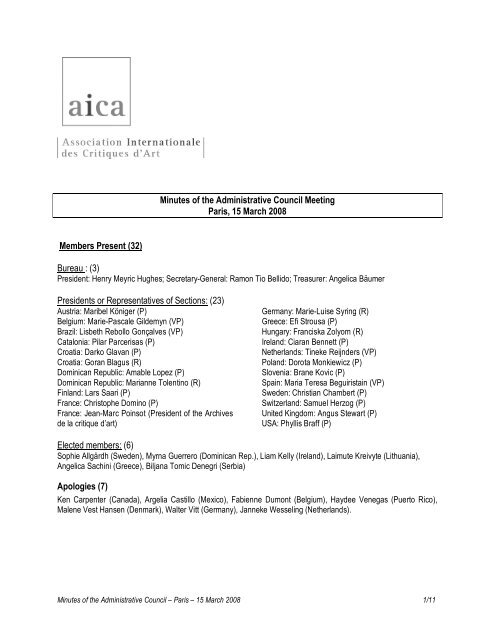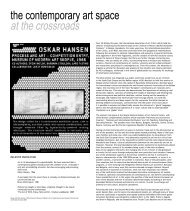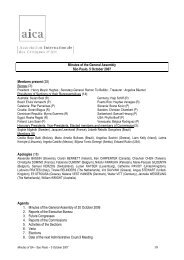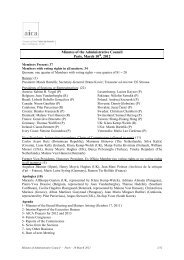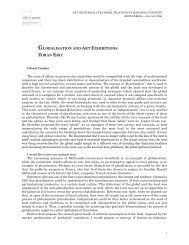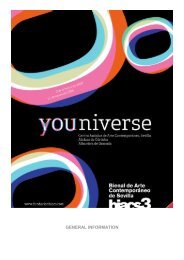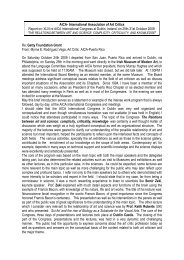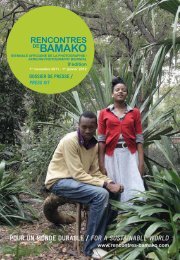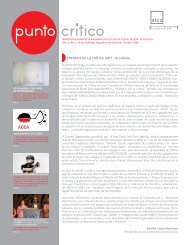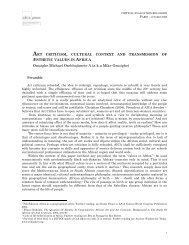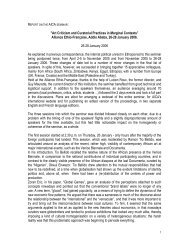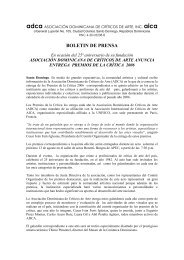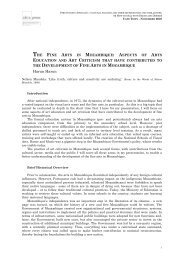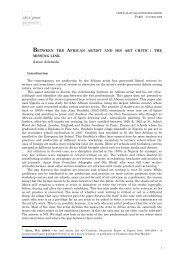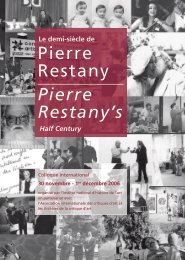Minutes of the Administrative Council Meeting ... - AICA international
Minutes of the Administrative Council Meeting ... - AICA international
Minutes of the Administrative Council Meeting ... - AICA international
You also want an ePaper? Increase the reach of your titles
YUMPU automatically turns print PDFs into web optimized ePapers that Google loves.
<strong>Minutes</strong> <strong>of</strong> <strong>the</strong> <strong>Administrative</strong> <strong>Council</strong> <strong>Meeting</strong><br />
Paris, 15 March 2008<br />
Members Present (32)<br />
Bureau : (3)<br />
President: Henry Meyric Hughes; Secretary-General: Ramon Tio Bellido; Treasurer: Angelica Bäumer<br />
Presidents or Representatives <strong>of</strong> Sections: (23)<br />
Austria: Maribel Königer (P)<br />
Belgium: Marie-Pascale Gildemyn (VP)<br />
Brazil: Lisbeth Rebollo Gonçalves (VP)<br />
Catalonia: Pilar Parcerisas (P)<br />
Croatia: Darko Glavan (P)<br />
Croatia: Goran Blagus (R)<br />
Dominican Republic: Amable Lopez (P)<br />
Dominican Republic: Marianne Tolentino (R)<br />
Finland: Lars Saari (P)<br />
France: Christophe Domino (P)<br />
France: Jean-Marc Poinsot (President <strong>of</strong> <strong>the</strong> Archives<br />
de la critique d’art)<br />
Germany: Marie-Luise Syring (R)<br />
Greece: Efi Strousa (P)<br />
Hungary: Franciska Zolyom (R)<br />
Ireland: Ciaran Bennett (P)<br />
Ne<strong>the</strong>rlands: Tineke Reijnders (VP)<br />
Poland: Dorota Monkiewicz (P)<br />
Slovenia: Brane Kovic (P)<br />
Spain: Maria Teresa Beguiristain (VP)<br />
Sweden: Christian Chambert (P)<br />
Switzerland: Samuel Herzog (P)<br />
United Kingdom: Angus Stewart (P)<br />
USA: Phyllis Braff (P)<br />
Elected members: (6)<br />
Sophie Allgårdh (Sweden), Myrna Guerrero (Dominican Rep.), Liam Kelly (Ireland), Laimute Kreivyte (Lithuania),<br />
Angelica Sachini (Greece), Biljana Tomic Denegri (Serbia)<br />
Apologies (7)<br />
Ken Carpenter (Canada), Argelia Castillo (Mexico), Fabienne Dumont (Belgium), Haydee Venegas (Puerto Rico),<br />
Malene Vest Hansen (Denmark), Walter Vitt (Germany), Janneke Wesseling (Ne<strong>the</strong>rlands).<br />
<strong>Minutes</strong> <strong>of</strong> <strong>the</strong> <strong>Administrative</strong> <strong>Council</strong> – Paris – 15 March 2008 1/11
Agenda<br />
1. <strong>Minutes</strong> <strong>of</strong> <strong>the</strong> last Board <strong>Meeting</strong> and Matters arising<br />
2. Reports <strong>of</strong> <strong>the</strong> Executive Bureau<br />
3. Any O<strong>the</strong>r Business<br />
4. Reports <strong>of</strong> <strong>the</strong> Commissions<br />
5. Congresses<br />
6. News from <strong>the</strong> Sections<br />
7. Date <strong>of</strong> next <strong>Meeting</strong><br />
The President, HMH, opened <strong>the</strong> session at 9.30 am<br />
He thanked Henri-Claude Cousseau and his staff for providing <strong>the</strong> <strong>Administrative</strong> <strong>Council</strong> a room and<br />
facilities for holding <strong>the</strong> meeting at <strong>the</strong> École Nationale Supérieure des Beaux-Arts. Christophe Domino<br />
reported that Cousseau had recently been elected to <strong>the</strong> membership <strong>of</strong> <strong>AICA</strong> France, at <strong>the</strong> Section’s last<br />
General Assembly.<br />
HMH announced that space would be found on <strong>the</strong> morning’s agenda for a short address by Jean-Marc<br />
Poinsot, Director <strong>of</strong> <strong>the</strong> Archive de la critique d’art.<br />
He fur<strong>the</strong>r drew <strong>the</strong> Committee’s attention to <strong>the</strong> letter <strong>of</strong> 11 February that <strong>the</strong> Bureau had received from<br />
René Berger, one <strong>of</strong> <strong>the</strong> Association’s Honorary Presidents, proposing a <strong>the</strong>me for <strong>the</strong> next Congress. It<br />
was agreed that meeting should continue for a couple <strong>of</strong> hours after lunch (for those who were free to<br />
attend) with an informal discussion <strong>of</strong> some <strong>of</strong> <strong>the</strong> issues raised in this letter.<br />
HMH also reported on <strong>the</strong> imminent creation <strong>of</strong> two new Sections, in Sou<strong>the</strong>rn Africa and Bolivia. Ramon<br />
Tio Bellido added that Nigerian Section had now resumed its activities, at <strong>the</strong> instigation <strong>of</strong> Azeez Ademola.<br />
1. <strong>Minutes</strong> <strong>of</strong> <strong>the</strong> Board <strong>Meeting</strong> <strong>of</strong> 30 September 2007<br />
HMH went through <strong>the</strong> draft minutes, page by page, and invited comments and amendments.<br />
He noted that <strong>the</strong>re was an error in <strong>the</strong> place and date which had been ascribed to <strong>the</strong> Board <strong>Meeting</strong> at <strong>the</strong><br />
head <strong>of</strong> <strong>the</strong> minutes, which should be 30 September 2007, in São Paulo, not ‘Moscow 3 March 2007’.<br />
He reported that Ca<strong>the</strong>rine Paviot, a former Elected Member, had described as inaccurate <strong>the</strong> statement on<br />
page 2 that she accepted as fact, that <strong>AICA</strong>’s Statutes were subject to French legislation. It was agreed that<br />
<strong>the</strong> minutes should be changed to reflect this.<br />
Subject to <strong>the</strong>se corrections being made, <strong>the</strong> draft minutes were unanimously approved.<br />
The amended text may be found at <strong>the</strong> following address: http://aica-int.org/spip.phparticle704<br />
2. Reports <strong>of</strong> <strong>the</strong> Executive Bureau<br />
The three reports are available, in full, on <strong>the</strong> <strong>AICA</strong> website, as follows http://www.aicaint.org/spip.phprubrique341<br />
President’s Report<br />
HMH went through his own report, point by point, focusing, in particular, on <strong>the</strong> following issues:<br />
- Congress in Brazil:<br />
He once more thanked Lisbeth Rebollo-Gonçalvez and her team for organising <strong>the</strong> last Congress in Brazil<br />
and circulated <strong>the</strong> most recent issue <strong>of</strong> ABCA’s journal, which contained detailed reports on this (cf.<br />
http://www.aica-int.org/spip.phparticle707)<br />
<strong>Minutes</strong> <strong>of</strong> <strong>the</strong> <strong>Administrative</strong> <strong>Council</strong> – Paris – 15 March 2008 2/11
- Membership & Fellowship Commission:<br />
Time permitting, HMH proposed discussing this item at greater length, at a later point in <strong>the</strong> agenda.<br />
- Elections:<br />
HMH reminded colleagues that <strong>the</strong>re would be elections for a new President and Treasurer, and for three<br />
new Vice-Presidents, at <strong>the</strong> next General Assembly. All paid-up members were eligible to present <strong>the</strong>ir<br />
candidature for any <strong>of</strong> <strong>the</strong>se posts, but <strong>the</strong>y would have to do this on <strong>the</strong> basis <strong>of</strong> a written programme,<br />
submitted to <strong>the</strong> Secretary-General three months in advance. He emphasised <strong>the</strong> importance <strong>of</strong> <strong>the</strong>se<br />
elections, as an occasion for <strong>the</strong> Association to take stock <strong>of</strong> itself and bring in fresh blood and new ideas.<br />
He emphasised that <strong>the</strong> post <strong>of</strong> President was far from merely honorific, and that anyone considering<br />
applying for this would have to be fully aware <strong>of</strong> <strong>the</strong> considerable responsibilities and workload <strong>the</strong> job<br />
entailed.<br />
Secretary-General’s Report<br />
RTB said that his report was relatively brief, given <strong>the</strong> short time that had elapsed between <strong>the</strong> last<br />
Congress and <strong>the</strong> current, interim Board meeting.<br />
- Cape Town Seminar<br />
RTB underlined <strong>the</strong> value and quality <strong>of</strong> this seminar, one <strong>of</strong> whose outcomes had been <strong>the</strong> successful<br />
creation <strong>of</strong> a new section <strong>of</strong> <strong>AICA</strong> Sou<strong>the</strong>rn Africa (to be formalised at <strong>the</strong> next General Assembly), bringing<br />
toge<strong>the</strong>r colleagues from Botswana, Namibia and Mozambique, in addition to South Africa itself. Zimbabwe,<br />
which had previously had a National Section <strong>of</strong> its own, had decided not to merge with <strong>the</strong> new Sou<strong>the</strong>rn<br />
African Section, but <strong>the</strong> matter would be kept under active review and had, indeed, be a topic for discussion<br />
at <strong>the</strong> Cape Town seminar.<br />
- EEYA<br />
RTB confirmed that this had been a thoroughly worthwhile and successful project. He predicted a deficit <strong>of</strong><br />
5,000 euros on <strong>the</strong> current budget for this, but that he firmly intended to find ways <strong>of</strong> filling this gap, so that it<br />
would not upset <strong>AICA</strong>’s general balance <strong>of</strong> accounts. There were reasonable grounds for optimism on this<br />
score, since it would now be going on to Thessaloniki, thanks to Efi Strousa’s assistance, and <strong>the</strong>n to<br />
Valencia, thanks to <strong>the</strong> support <strong>of</strong> Maria Teresa Beguiristain. The exhibition would thus be shown at a<br />
minimum <strong>of</strong> three venues.<br />
RTB recalled that quite a number <strong>of</strong> members had criticised this project at <strong>the</strong> outset and expressed<br />
reservations about <strong>the</strong> specific role that art criticism might have to play, in relation to curatorial practice, but<br />
he had concluded never<strong>the</strong>less that this exhibition had contributed significantly to raising <strong>AICA</strong>’s pr<strong>of</strong>ile and<br />
enhancing its activities, through <strong>the</strong> media. HMH congratulated RTB on <strong>the</strong> outcome and on seeing this<br />
project through, in <strong>the</strong> teeth <strong>of</strong> considerable odds.<br />
- Macedonia/ FYROM<br />
RTB reported that <strong>the</strong> Bureau had received an <strong>of</strong>ficial protest from <strong>the</strong> Greek Section (Efi Strousa) about<br />
<strong>the</strong> erroneous references that had been made to <strong>the</strong> state <strong>of</strong> ‘Macedonia’ on <strong>the</strong> <strong>AICA</strong> website and in <strong>AICA</strong><br />
documents. On behalf <strong>of</strong> <strong>the</strong> Bureau, he expressed his unreserved apologies and confirmed that <strong>the</strong> Bureau<br />
would henceforth adhere strictly to UNESCO’s policy for (as proved to be <strong>the</strong> case) designating this country<br />
<strong>the</strong> ‘Former Yugoslav Republic <strong>of</strong> Macedonia (FYROM)’. In order to save time, HMH proposed to Efi<br />
Strousa that, if she were in agreement with this decision (which she was), it might be preferable to circulate<br />
separately <strong>the</strong> document signed by members <strong>of</strong> <strong>AICA</strong>-Hellas, that she had brought with her, ra<strong>the</strong>r than<br />
read it out, in full. This was agreed.<br />
RTB went on to say that he had recently received a visit from <strong>the</strong> Ambassador <strong>of</strong> FYROM, who had invited<br />
<strong>AICA</strong> to collaborate with him, in developing some form <strong>of</strong> joint project in situ. RTB had proposed combining<br />
this with a seminar in Skopje and Yerevan, such as had already been under consideration by <strong>the</strong> Bureau<br />
and had formed <strong>the</strong> basis for a recent bid for funds to UNESCO’s Participation Programmed for <strong>the</strong> new<br />
<strong>Minutes</strong> <strong>of</strong> <strong>the</strong> <strong>Administrative</strong> <strong>Council</strong> – Paris – 15 March 2008 3/11
Biennium, 2008-9. This would also fit in with <strong>the</strong> existing plans for a publication on Twentieth Century Art in<br />
<strong>the</strong> Balkans, by <strong>the</strong> end <strong>of</strong> <strong>the</strong> current year. He mentioned, in this connection, that he had planned to visit<br />
Macedonia at <strong>the</strong> end <strong>of</strong> <strong>the</strong> month to take discussions a stage fur<strong>the</strong>r, but that he had unfortunately been<br />
compelled to postpone this trip, for reasons beyond his control. He also mentioned, in passing, that <strong>the</strong><br />
recent deterioration <strong>of</strong> <strong>the</strong> situation in Armenia posed a threat to Yerevan’s ability to take part in <strong>the</strong> project.<br />
Publications<br />
RTB reminded colleagues that it was imperative for <strong>AICA</strong> to produce a French publication <strong>of</strong> selected<br />
papers from <strong>the</strong> three African seminars, in <strong>the</strong> course <strong>of</strong> <strong>the</strong> current calendar year – o<strong>the</strong>rwise, it would<br />
have to return <strong>the</strong> Centre National du Livre’s grant towards <strong>the</strong> cost <strong>of</strong> translations, and this would be<br />
stupid! As had been already agreed, only a selection <strong>of</strong> <strong>the</strong> papers delivered at <strong>the</strong>se seminars would be<br />
published in hard copy, though all <strong>the</strong> papers would be made freely available on <strong>the</strong> website.<br />
Funds permitting, RTB reaffirmed <strong>the</strong> Bureau’s resolve to produce an updated and modified version <strong>of</strong><br />
<strong>AICA</strong>’s 50 th anniversary publication in English, before <strong>the</strong> elections at <strong>the</strong> end <strong>of</strong> <strong>the</strong> calendar year. He<br />
estimated <strong>the</strong> total cost at 6000 euros.<br />
- Congress<br />
Both <strong>AICA</strong> Australia and <strong>the</strong> members <strong>of</strong> <strong>the</strong> Bureau much regretted <strong>the</strong> forced cancellation <strong>of</strong> plans for <strong>the</strong><br />
Annual Congress to be held in July 2008, owing to <strong>the</strong> lack <strong>of</strong> response from <strong>the</strong> two principal government<br />
funders, in time to be <strong>of</strong> any use. However, HMH reported that he had seen Tony Bond, <strong>the</strong> Secretary <strong>of</strong><br />
<strong>AICA</strong> Australia, only a few days previously, and <strong>the</strong> latter had held out some prospect <strong>of</strong> reinstating this<br />
proposal for a Congress in Australia for <strong>the</strong> year 2012 – <strong>the</strong> more especially, since <strong>the</strong> Federal government<br />
had just taken steps to set up a new fund that would support <strong>international</strong> events <strong>of</strong> this kind, in future.<br />
RTB thanked Pilar Parcerisas and Maria Teresa Beguiristain warmly for <strong>of</strong>fering to organise <strong>the</strong> Congress in<br />
Barcelona and Valencia, respectively, at a later period in <strong>the</strong> year and said he would leave it to <strong>the</strong>m to give<br />
fuller details <strong>of</strong> this, under <strong>the</strong> relevant point on <strong>the</strong> agenda.<br />
- Elections<br />
RTB once more emphasised <strong>the</strong> importance <strong>of</strong> taking into account <strong>the</strong> full implications <strong>of</strong> <strong>the</strong> phenomenon<br />
<strong>of</strong> globalisation and <strong>the</strong> advantages <strong>of</strong> considering <strong>the</strong> possibility <strong>of</strong> electing a new President who did not<br />
come from <strong>the</strong> ‘West’.<br />
- Activities <strong>of</strong> <strong>the</strong> Bureau<br />
RTB stressed that <strong>the</strong> Bureau had to shoulder an ever-increasing burden <strong>of</strong> work. Anne-Claude Morice was<br />
due back from maternity leave at <strong>the</strong> beginning <strong>of</strong> May. It would <strong>the</strong>n be necessary to take decisions, not<br />
only about her own future, but about that <strong>of</strong> Alexandra Gillet and Akiko Issaverdens. He hoped that<br />
Alexandra could stay on until <strong>the</strong> end <strong>of</strong> <strong>the</strong> year, to see through <strong>the</strong> EEYA project. It would be necessary to<br />
increase <strong>the</strong> amount <strong>of</strong> time that Akiko spent in <strong>the</strong> <strong>of</strong>fice, if <strong>the</strong> Bureau were to be confident <strong>of</strong> meeting all<br />
its existing commitments.<br />
RTB said that it was vital, in this context, for Board members to understand <strong>the</strong> importance <strong>of</strong> identifying<br />
new sources <strong>of</strong> funding. HMH thanked RTB for his report and congratulated him on his hard work over <strong>the</strong><br />
past six months. He also agreed that <strong>the</strong> EEYA project had been <strong>of</strong> considerable value to <strong>AICA</strong>.<br />
Discussion<br />
Marianne de Tolentino said she was very interested in <strong>the</strong> EEYA project and asked whe<strong>the</strong>r it might be<br />
possible to consider presenting this exhibition in <strong>the</strong> Caribbean, with <strong>the</strong> help <strong>of</strong> European funding. Lisbeth<br />
Rebollo Gonçalves said that, if <strong>the</strong> exhibition went to <strong>the</strong> Caribbean, she would also be interested in taking it<br />
on to Brazil. She pointed out that <strong>the</strong> Museum <strong>of</strong> Contemporary Art in São Paulo was due to move into a<br />
new building in 2009-10, and that it would, <strong>the</strong>refore, be in a better position to take over <strong>the</strong> exhibition at<br />
that point.<br />
Tineke Reijnders congratulated <strong>the</strong> team for organising <strong>the</strong> exhibition, but asked why all <strong>the</strong> sponsors <strong>of</strong> <strong>the</strong><br />
exhibition had been mentioned in RTB’s report, but not his account <strong>of</strong> <strong>the</strong> seminar in Cape Town.<br />
<strong>Minutes</strong> <strong>of</strong> <strong>the</strong> <strong>Administrative</strong> <strong>Council</strong> – Paris – 15 March 2008 4/11
RTB replied that, as far as <strong>the</strong> exhibition was concerned, he did not know whe<strong>the</strong>r it would be possible to<br />
keep it toge<strong>the</strong>r for such a long period, as several works would have to be returned to <strong>the</strong>ir owners. As for<br />
European funding, <strong>AICA</strong> had already been unsuccessful in its earlier application to <strong>the</strong> EU. Thessaloniki<br />
envisaged <strong>the</strong> possibility <strong>of</strong> creating some kind <strong>of</strong> ‘No Borders’ Biennale, though he could not say what<br />
chances <strong>the</strong>re were that this might succeed, in view <strong>of</strong> <strong>the</strong> costs involved. At all events, he could well<br />
imagine building in some stopovers in <strong>the</strong> Americas, if <strong>the</strong>se plans ever came to fruition.<br />
Maribel Königer asked what criteria were used, to fix <strong>the</strong> annual tariffs applicable to <strong>the</strong> various Sections.<br />
RTB replied that <strong>the</strong> tariffs applied, in accordance with UNESCO’s recommendations, were those used by<br />
<strong>the</strong> World Bank.<br />
Treasurer’s Report<br />
Angelica Bäumer explained that her report was set out in such a way as to enable Board members to make<br />
comparisons between <strong>the</strong> figures for 2006 and those for 2007.<br />
Point by point, she went through <strong>the</strong> different sources <strong>of</strong> income for <strong>the</strong> two successive years.<br />
The prospective out-turn for 2007 was not particularly good, since it looked as if <strong>the</strong>re would be a final<br />
deficit in <strong>the</strong> region <strong>of</strong> 5000 euros.<br />
The budget predicated for 2008 was 189,000 euros.<br />
AB highlighted <strong>the</strong> routine nature <strong>of</strong> most <strong>of</strong> <strong>the</strong> Bureau’s work and <strong>the</strong> fact that everything it did cost<br />
money. Hence <strong>the</strong> importance <strong>of</strong> ensuring that Sections paid over <strong>the</strong>ir dues on a regular basis, if <strong>AICA</strong> was<br />
to operate effectively.<br />
The most expensive items for <strong>the</strong> year just ended had been <strong>the</strong> publications and <strong>the</strong> EEYA exhibition.<br />
HMH thanked AB for her report. He added that Haydee Venegas, <strong>the</strong> President ot <strong>the</strong> Finance Commission<br />
had sent her regrets at being prevented from attending <strong>the</strong> meeting, as she had had to go into hospital at<br />
short notice. However, Haydee had agreed to allow him to mention that she would be a firm candidate for<br />
<strong>the</strong> post <strong>of</strong> Treasurer at <strong>the</strong> elections in <strong>the</strong> autumn.<br />
Phyllis Braff asked whe<strong>the</strong>r <strong>the</strong> Bureau had received a grant towards <strong>the</strong> translation costs <strong>of</strong> <strong>the</strong><br />
proceedings <strong>of</strong> <strong>the</strong> seminars in Africa. AB replied that it had, and RTB specified that <strong>the</strong> main financial<br />
support had come from <strong>the</strong> CNL (Centre National du Livre). AB stressed that it would still make a huge<br />
difference, if additional funds could be raised from alternative sources.<br />
RTB added, à propos <strong>of</strong> this, that all documents issued by <strong>the</strong> Bureau that had to be translated were dealt<br />
with by HMH, Maria Teresa Beguiristain and himself, in a rough and ready way.<br />
Dorota Monkiewicz commented that <strong>the</strong> number <strong>of</strong> members <strong>of</strong> <strong>the</strong> Polish Section indicated in Angelica’s<br />
report did not correspond to <strong>the</strong> number <strong>of</strong> subscriptions paid over by <strong>the</strong> Section and asked for <strong>the</strong><br />
document that had been circulated to be updated, to reflect this.<br />
Christian Chambert, likewise, said that <strong>the</strong>re were only 253 members in <strong>the</strong> Swedish Section, whereas <strong>the</strong><br />
figure given in <strong>the</strong> document had been 263.<br />
Marianne de Tolentino added that she had paid over <strong>the</strong> Dominican Republic’s subscriptions for 2007 and<br />
2008, but that <strong>the</strong>se did not feature in <strong>the</strong> paper.<br />
RTB explained that <strong>the</strong> figures that had been circulated corresponded to <strong>the</strong> calendar year, and that <strong>the</strong><br />
reason for <strong>the</strong> apparent discrepancies was that <strong>the</strong>se payments fell outside <strong>the</strong> period covered by <strong>the</strong> end<strong>of</strong>-year<br />
reconciliation. He assured Board members that, so far as was possible, <strong>the</strong> membership lists were<br />
updated on a regular basis, to incorporate <strong>the</strong> most recent information received from <strong>the</strong> different Sections.<br />
Finally, he pointed out that, in analysing <strong>the</strong> documents that had been circulated, members should<br />
remember to make a distinction between <strong>the</strong> numbers <strong>of</strong> members in a Section at any given time and <strong>the</strong><br />
number <strong>of</strong> fees that were due. The latter figure was directly related to <strong>the</strong> number <strong>of</strong> stamps sent out in <strong>the</strong><br />
course <strong>of</strong> <strong>the</strong> year. HMH reminded Board members yet again that <strong>the</strong>y were obliged to account in detail for<br />
<strong>Minutes</strong> <strong>of</strong> <strong>the</strong> <strong>Administrative</strong> <strong>Council</strong> – Paris – 15 March 2008 5/11
all stamps <strong>the</strong>y had been sent in a given financial year and were liable to pay for all each and every one,<br />
that had not been returned unused, or o<strong>the</strong>rwise accounted for. The Bureau had drafted a new simplified<br />
version <strong>of</strong> <strong>the</strong> annual return that was required from Sections and would shortly be posting this on <strong>the</strong><br />
website and sending it out to all Sections to complete, in relation to <strong>the</strong> financial year just ended.<br />
Liam Kelly returned to <strong>the</strong> issue <strong>of</strong> <strong>the</strong> small anticipated deficit for 2007. He agreed that <strong>the</strong> publication <strong>of</strong><br />
<strong>the</strong> proceedings <strong>of</strong> <strong>the</strong> three seminars in Africa would have to go ahead, so that <strong>the</strong> Association would not<br />
have to reimburse <strong>the</strong> grant for translations, that had already been spent. However, he suggested that<br />
preparing a new edition <strong>of</strong> <strong>the</strong> 50 th anniversary publication should not be regarded as such a high priority, in<br />
<strong>the</strong> circumstances.<br />
As far as <strong>the</strong> payment <strong>of</strong> subscriptions was concerned, Phyllis Braff suggested that it should be easier for<br />
countries paying in euros to settle <strong>the</strong>ir dues first, as this was likely to be easier for <strong>the</strong>m than for o<strong>the</strong>rs.<br />
HMH reminded her, however, that <strong>the</strong> USA was now <strong>the</strong> only Section to continue to use <strong>the</strong> Association’s<br />
dollars account for <strong>the</strong> settlement <strong>of</strong> <strong>the</strong>ir dues.<br />
Efi Strousa sought clarification <strong>of</strong> an issue relating to <strong>the</strong> return <strong>of</strong> unused stamps at <strong>the</strong> end <strong>of</strong> <strong>the</strong> financial<br />
year. She thanked AB for all <strong>the</strong> work she had done to sort things out, in <strong>the</strong> course <strong>of</strong> her mandate.<br />
AB replied that this had not always been easy, as she could not be in Paris <strong>of</strong>ten enough, to be able to keep<br />
a regular check on <strong>the</strong> financial aspects <strong>of</strong> <strong>the</strong> Association’s daily business.<br />
3. Any o<strong>the</strong>r Business<br />
- Proxy votes<br />
HMH drew <strong>the</strong> Board’s attention to <strong>the</strong> letter <strong>of</strong> that had been circulated with <strong>the</strong> Board papers and <strong>the</strong> two<br />
issues (one major and <strong>the</strong> o<strong>the</strong>r minor) on which <strong>the</strong> Board’s guidance was sought, namely:<br />
A. Proxy voting<br />
B. The exercise by <strong>the</strong> President and one or two o<strong>the</strong>r Board members <strong>of</strong> a second vote, in certain<br />
specific circumstances.<br />
A. Liam Kelly mentioned that, quite apart from <strong>the</strong> fact that a relatively small percentage <strong>of</strong> Board<br />
members were able on any occasion to attend a Board meeting in person, it was necessary to take into<br />
account <strong>the</strong> likelihood that a number <strong>of</strong> those who could were likely not to be able to stay on to <strong>the</strong> very<br />
end. For this reason, he suggested bringing <strong>the</strong> General Assembly forward to a point, say, two days before<br />
<strong>the</strong> end <strong>of</strong> <strong>the</strong> Congress. Christian Chambert suggested increased use <strong>of</strong> <strong>the</strong> website for sounding out<br />
members’ opinions on issues that had to be submitted to a vote and <strong>the</strong> introduction <strong>of</strong> a procedure that<br />
would facilitate Board members’ task, in presenting to <strong>the</strong>ir members issues that had been discussed by <strong>the</strong><br />
Board. He added that he could not see <strong>the</strong>re was anything about proxy voting in <strong>the</strong> Statutes.<br />
Maribel Königer agreed that <strong>the</strong>re was nothing in <strong>the</strong> International Statutes about proxy voting, but she said<br />
that <strong>the</strong> Austrian Section used it to help overcome <strong>the</strong> problems connected with <strong>the</strong> federalised structure <strong>of</strong><br />
<strong>the</strong> membership. In <strong>the</strong> Austrian case, however, no individual was allowed to cast more than three proxy<br />
votes, and candidates in elections were prohibited from casting proxy votes. The Austrian Section already<br />
made use <strong>of</strong> <strong>the</strong> website for constituting groups, and for communicating with members in <strong>the</strong> run-up to<br />
elections.<br />
Efi Strousa concluded that, if <strong>the</strong> Board did not wish to propose changing <strong>the</strong> Statutes, it would have to<br />
accept <strong>the</strong> principle <strong>of</strong> proxy voting, with a ceiling on <strong>the</strong> number <strong>of</strong> proxy votes that any single person<br />
would be allowed to cast. Certainly, a greater degree <strong>of</strong> flexibility was called for, in her view.<br />
<strong>Minutes</strong> <strong>of</strong> <strong>the</strong> <strong>Administrative</strong> <strong>Council</strong> – Paris – 15 March 2008 6/11
Lars Saari was sceptical about <strong>the</strong> whole issue <strong>of</strong> proxy voting, since this, for him, posed a question <strong>of</strong><br />
ethics and democratic accountability, to <strong>the</strong> extent that members <strong>of</strong> <strong>the</strong> Bureau were in a position to<br />
accumulate a disproportionate amount <strong>of</strong> votes.<br />
RTB explained once more that <strong>AICA</strong>’s Statutes were based on French law, and on <strong>the</strong> 1901 Law on nonpr<strong>of</strong>it-making<br />
Associations, in particular. The problem lay in <strong>the</strong> size <strong>of</strong> <strong>the</strong> Association’s membership, which<br />
meant that nothing could be decided without recourse to proxy voting. It was perfectly normal, to expect that<br />
not all Board members could be present at every meeting, and casting doubt on <strong>the</strong> efficacy <strong>of</strong> proxy voting<br />
was likely to impair <strong>the</strong> Association’s ability to discharge its duties effectively.<br />
In summing up, HMH said that he and his fellow Bureau members were convinced that <strong>the</strong>re could be no<br />
suggestion <strong>of</strong> impropriety, in <strong>the</strong> way <strong>the</strong> issue <strong>of</strong> proxy opting had been handled in <strong>the</strong> past – not least,<br />
because no decisions <strong>of</strong> substance had been taken at Board meetings that had not also been subsequently<br />
referred to <strong>the</strong> General Assembly for formal approval, and because <strong>the</strong> proxy votes that had been sought,<br />
and obtained, in <strong>the</strong> past, a means <strong>of</strong> reinforcing a sense <strong>of</strong> representativity, had never, in fact been<br />
invoked. Moreover, <strong>the</strong>re was nothing to say that proxy votes, if allowable, had to be vested in members <strong>of</strong><br />
<strong>the</strong> Bureau ra<strong>the</strong>r than in o<strong>the</strong>r individual Board members, though experience suggested that this was,<br />
indeed, more likely than not to be <strong>the</strong> case.<br />
1. HMH accepted <strong>the</strong> helpful recommendation, that Board meetings should open with a public<br />
statement <strong>of</strong> <strong>the</strong> number and names <strong>of</strong> members deemed eligible to vote that day.<br />
2. He asserted that it was quite clear that <strong>AICA</strong>’s Statutes were governed by French law and not,<br />
somehow, ‘free-standing’, as had been suggested.<br />
3. Given that <strong>the</strong>re was a lack <strong>of</strong> clarity about proxy voting (and even <strong>the</strong> use <strong>of</strong> <strong>the</strong> term), owing to a<br />
conflict about what was said (or not said) about it in <strong>the</strong> Statutes and <strong>the</strong> current Regulations and<br />
uncertainty about <strong>the</strong> interpretation <strong>of</strong> <strong>the</strong> Statutes under French law, <strong>the</strong>re was a need for <strong>the</strong> Bureau to<br />
formulate a clear view and circulate Board members about this, well in advance <strong>of</strong> <strong>the</strong> next Board meeting<br />
and General Assembly<br />
4. There <strong>the</strong>n remained <strong>the</strong> options for <strong>the</strong> Board <strong>of</strong> proposing to <strong>the</strong> General Assembly a continuation<br />
<strong>of</strong> <strong>the</strong> status quo, with or without <strong>the</strong> supposed benefits <strong>of</strong> proxy voting or, if needs be, <strong>of</strong> changing <strong>the</strong><br />
Statutes (e.g. to permit proxy voting, if necessary, or to reduce <strong>the</strong> threshold for quoracy).<br />
B. One or two Board members spoke out against anyone exercising more than one vote on <strong>the</strong> Board. RTB<br />
suggested that HMH, in any event, possessed two votes, in his dual capacity <strong>of</strong> International President and<br />
President <strong>of</strong> <strong>the</strong> Open Section.<br />
N.B. HMH himself considers that this might be a complication, given also that o<strong>the</strong>rs may also legitimately<br />
have a claim to a second vote, if <strong>the</strong>y combine <strong>the</strong> functions <strong>of</strong> President <strong>of</strong> a Section and Chair <strong>of</strong> a<br />
Commission, for example, or that <strong>of</strong> President <strong>of</strong> a Section with that <strong>of</strong> Vice-President <strong>of</strong> <strong>the</strong> Association.<br />
The Bureau have subsequently decided, on reflection that <strong>the</strong>y wish to propose that <strong>the</strong> only form <strong>of</strong> ‘double<br />
voting’ that should be allowed should take <strong>the</strong> form <strong>of</strong> a second, casting vote by <strong>the</strong> President, in <strong>the</strong> case<br />
<strong>of</strong> a tied vote by members <strong>of</strong> <strong>the</strong> Board on any individual issue. In <strong>the</strong> absence <strong>of</strong> comments to <strong>the</strong> contrary<br />
or alternative suggestions by Board members before <strong>the</strong> end <strong>of</strong> May 2008, <strong>the</strong> Bureau will set about drafting<br />
a proposal for <strong>the</strong> minimal change to <strong>the</strong> Statues that this would require, for circulation to <strong>the</strong> membership<br />
at least two months in advance <strong>of</strong> <strong>the</strong> next General Assembly).<br />
At <strong>the</strong> end <strong>of</strong> <strong>the</strong> debate, Angus Stewart formally proposed that <strong>the</strong> correct way forward would now, indeed,<br />
be for <strong>the</strong> Bureau to seek a legal ruling on <strong>the</strong> field <strong>of</strong> jurisdiction that covered <strong>the</strong> <strong>AICA</strong> Statutes and to<br />
prepare suitable options for exercising (or continuing to exercise) a quorum, that could be debated and<br />
voted upon at <strong>the</strong> General Assembly. This was agreed.<br />
<strong>Minutes</strong> <strong>of</strong> <strong>the</strong> <strong>Administrative</strong> <strong>Council</strong> – Paris – 15 March 2008 7/11
- Archives de la Critique d’Art<br />
HMH thanked Jean-Marc Poinsot for attending <strong>the</strong> meeting, in his capacity as ex <strong>of</strong>ficio member <strong>of</strong> <strong>the</strong><br />
Board, on a reciprocal basis with representatives <strong>of</strong> <strong>the</strong> <strong>AICA</strong> Bureau and gave him <strong>the</strong> floor.<br />
Jean-Marc Poinsot reported that <strong>the</strong> principal news he could give was that a decision had been taken to<br />
construct a new building that would be completed in 2012. The challenge was not merely to raise funds for<br />
constructing a new building that would provide a permanent home for <strong>the</strong> Archive, but to promote activities<br />
in <strong>the</strong> fields <strong>of</strong> criticism and research.<br />
Two years ago, <strong>the</strong> Archives had organised a joint seminar on Pierre Restany with <strong>AICA</strong>. The Proceedings<br />
were due to be published in autumn 2008 and would be particularly rich in new material. Activities such as<br />
this provided a good opportunity for taking a critical look at <strong>the</strong> Archive.<br />
The Archive also had connections with <strong>the</strong> Getty. Its resources were <strong>of</strong> sufficient quality to act as a spur to<br />
<strong>international</strong> collaboration. It was currently developing new residency programmes and <strong>the</strong>mes for a range<br />
<strong>of</strong> <strong>international</strong> seminars.<br />
Jena-Marc Poinsot distributed copies <strong>of</strong> a briefing document to everyone present and invited comments and<br />
suggestions.<br />
Dorota Monkiewicz asked where <strong>the</strong> Archive was located. JMP gave a brief account <strong>of</strong> its history and<br />
current location near Rennes, in Brittany, on premises which it shared with <strong>the</strong> regional collections (FRAC),<br />
which planned to move to a building directly opposite. The Archive’s new building would benefit from<br />
financial support from <strong>the</strong> City <strong>of</strong> Rennes, <strong>the</strong> Ministry <strong>of</strong> Culture and modest contributions from private<br />
sources, earmarked for specific activities.<br />
Marie-Luise Syring asked how members <strong>of</strong> <strong>AICA</strong> could participate in <strong>the</strong> Archive’s activities, and what role<br />
<strong>the</strong>y might be able to play. JMP explained that <strong>the</strong> Archive and <strong>AICA</strong> had always maintained close links at<br />
an individual level, and that everyone was free to choose whe<strong>the</strong>r or not to participate in specific<br />
programmes.<br />
Among o<strong>the</strong>r things, <strong>the</strong> Archive also edited a French language quarterly review, that was dedicated to new<br />
publications about art in French and provided a syn<strong>the</strong>sis <strong>of</strong> what was going on elsewhere, by country and<br />
region. However, this publication needed additional funding if it was to grow and develop. Members <strong>of</strong> <strong>AICA</strong><br />
could be <strong>of</strong> assistance, in providing information about o<strong>the</strong>r archives and publications.<br />
HMH thanked JMP and stressed <strong>the</strong> importance <strong>of</strong> <strong>the</strong> work that <strong>the</strong> Archives had undertaken in <strong>the</strong> field <strong>of</strong><br />
art criticism over <strong>the</strong> past 20 years.<br />
4. Reports <strong>of</strong> <strong>the</strong> Commissions<br />
HMH introduced <strong>the</strong> subject, by thanking Commission members for <strong>the</strong>ir valuable work. At <strong>the</strong> same time,<br />
he recorded his disappointment that it had still proved impossible to persuade any single Commission to<br />
draft clear terms <strong>of</strong> reference and confirm its membership and <strong>the</strong>ir terms <strong>of</strong> <strong>of</strong>fice, for publication on <strong>the</strong><br />
website, despite repeated request for this to be done, over a period <strong>of</strong> from two to three years. He<br />
considered that <strong>the</strong> status, purpose and functions <strong>of</strong> <strong>the</strong> Commissions needed to be looked at in some<br />
detail, at a later date. In <strong>the</strong> meantime, he himself would now attempt to prepare outline descriptions <strong>of</strong><br />
<strong>the</strong>m, and <strong>of</strong> <strong>the</strong>ir current role and membership, for presentation on <strong>the</strong> website.<br />
- Electoral and Membership Commission<br />
AB reported that she and Angus Stewart had examined <strong>the</strong> dossiers <strong>of</strong> individual applicants to join <strong>AICA</strong><br />
over <strong>the</strong> previous six months. Practically, according to <strong>the</strong> new statutes, everyone elected to one <strong>of</strong> <strong>the</strong><br />
national Sections had been accepted. Though, <strong>the</strong> commission emphasized <strong>the</strong>re had been one or two<br />
cases where <strong>the</strong> applicants appeared not to have had three full years <strong>of</strong> solid experience.<br />
<strong>Minutes</strong> <strong>of</strong> <strong>the</strong> <strong>Administrative</strong> <strong>Council</strong> – Paris – 15 March 2008 8/11
HMH drew attention to <strong>the</strong> fact that certain Sections still had not submitted draft new Statutes or had not<br />
made <strong>the</strong> recommended changes to <strong>the</strong>ir Statutes more than three years after new International Statutes<br />
had been approved. He warned <strong>the</strong> Presidents <strong>of</strong> those Sections that <strong>the</strong>y were now disqualified from<br />
voting at Board meetings, proposing new members <strong>of</strong> <strong>the</strong> Association and participating in <strong>the</strong> elections at<br />
<strong>the</strong> end <strong>of</strong> <strong>the</strong> year, until and unless <strong>the</strong>y took urgent steps to rectify <strong>the</strong> matter.<br />
Christian Chambert asked <strong>the</strong> Bureau, specifically to confirm that Sections might now propose new<br />
members at <strong>the</strong> time <strong>of</strong> <strong>the</strong> interim Board meeting, as well as at <strong>the</strong> time <strong>of</strong> <strong>the</strong> second Board meeting <strong>of</strong> <strong>the</strong><br />
year, which customarily preceded <strong>the</strong> General Assembly. This was agreed, though HMH pointed out that<br />
<strong>the</strong> General Assembly still provided <strong>the</strong> only occasion in <strong>the</strong> year when <strong>the</strong> status <strong>of</strong> new members could be<br />
formally endorsed.<br />
- Fellowship Commission<br />
Tineke Reijnders reported on <strong>the</strong> work <strong>of</strong> her Commission, as follows:<br />
Criteria for membership via <strong>AICA</strong>’s Fellowship Fund<br />
1. Pr<strong>of</strong>essional critics/curators from countries economically not well <strong>of</strong>f, in general from Band 2 countries, and<br />
<strong>the</strong>refore cut <strong>of</strong>f from <strong>the</strong> regular possibility <strong>of</strong> being/becoming an <strong>AICA</strong>-member, may apply or may be invited by<br />
<strong>AICA</strong> for membership via <strong>AICA</strong>’s Fellowship Fund.<br />
2. Invited candidate members are compelled to pass <strong>the</strong> standard regulations for membership and to provide an<br />
indication <strong>of</strong> <strong>the</strong>ir financial urgency.<br />
3. Candidate members join <strong>the</strong>ir national section if possible, o<strong>the</strong>rwise <strong>the</strong>y join <strong>the</strong> free section. The president <strong>of</strong><br />
<strong>the</strong>se sections will countersign <strong>the</strong> application.<br />
4. The Fellowship membership will be valid for three years.<br />
5. <strong>AICA</strong>’s International Fellowship Commission is responsible for actively searching and inviting candidates. It is also<br />
responsible for <strong>the</strong> evaluation <strong>of</strong> <strong>the</strong> applications. This responsibility is controlled by <strong>the</strong> Executive Committee and <strong>the</strong><br />
Financial Oversight Commission.<br />
Ad 1. In exceptional cases it might be fair to consider also candidates from Band A countries (Band A means for<br />
<strong>AICA</strong>-membership a regular subscription <strong>of</strong> 50 euros, Band B: 30 euros). Situations are subject to change; evaluation<br />
should be left at <strong>the</strong> discretion <strong>of</strong> <strong>the</strong> International Fellowship Commission, that will seek advice from financial experts<br />
<strong>of</strong> NGO’s like Prince Clausfund.<br />
Ad 2. Individual financial urgency must be considered in <strong>the</strong> national context. Expertise should be sought as above.<br />
Ad 3. Beneficiaries might normally be guaranteed three years’ free membership, on <strong>the</strong> strict understanding that <strong>the</strong>re<br />
would be no extensions. After that period alternative funding must be sought. In exceptional cases <strong>the</strong> International<br />
Fellowship Commission might propose a new term if <strong>the</strong> funding permits such an exception.<br />
Ad 4. Members <strong>of</strong> <strong>AICA</strong> in Band B sections or Funds with expertise are invited to provide names <strong>of</strong> talented critics<br />
who merit a membership. So far several key experts have been consulted. The lists <strong>of</strong> selected candidates should be<br />
ready before <strong>the</strong> Board <strong>Meeting</strong> that preceeds <strong>the</strong> annual congress. The selected candidates than will get <strong>the</strong>ir written<br />
invitation form <strong>the</strong> Bureau in Paris.<br />
As far as discharge <strong>of</strong> <strong>the</strong> fee concerns critics who are already member <strong>of</strong> <strong>AICA</strong>, discreteness must be guaranteed.<br />
Essential to <strong>the</strong> Fellowship Fund is <strong>the</strong> condition that individual <strong>AICA</strong>-members voluntarily participate in this Fund.<br />
Members (<strong>of</strong> national sections and <strong>of</strong> <strong>the</strong> Open Section) are requested to pay twice <strong>the</strong>ir <strong>international</strong> fee, which<br />
means 100 euros (plus <strong>the</strong> national fee), or 60 euros (plus <strong>the</strong> national fee) per annum. The presidents <strong>of</strong> all <strong>the</strong><br />
sections are invited to make a serious and competitive effort <strong>of</strong> at least a 25% result.<br />
Members <strong>of</strong> <strong>the</strong> Executive Committee toge<strong>the</strong>r with <strong>the</strong> members <strong>of</strong> <strong>the</strong> Fellowship Commission do actively<br />
encourage <strong>the</strong> national boards. The results <strong>of</strong> <strong>the</strong> national percentage will be published regularly on <strong>the</strong> <strong>AICA</strong>-site, in<br />
order to stimulate and to enhance <strong>the</strong> loyalty <strong>of</strong> <strong>the</strong> old members with <strong>the</strong> new members.<br />
Donating members receive a declaration that states <strong>the</strong>ir participation.<br />
Fellowship Fund Commission<br />
15-03-08<br />
Tineke Reijnders, Marie-Pascale Gildemyn, Irini Savvani<br />
<strong>Minutes</strong> <strong>of</strong> <strong>the</strong> <strong>Administrative</strong> <strong>Council</strong> – Paris – 15 March 2008 9/11
HMH thanked TR and her fellow Commissioners for <strong>the</strong>ir sensitive proposals and expressed <strong>the</strong> hoped that<br />
<strong>the</strong> fund could now be <strong>of</strong>ficially launched, without fur<strong>the</strong>r delay. He pointed out that it was now agreed that<br />
all proposals for distributing funds should be channeled through <strong>the</strong> Commission, but that <strong>the</strong> options<br />
remained, <strong>of</strong> donating three-year (or longer) Fellowships ei<strong>the</strong>r anonymously, or to an individual specifically<br />
named by <strong>the</strong> donor. He suggested that priority should be given, initially, to subventing new members <strong>of</strong> <strong>the</strong><br />
Association, and certain individuals and members from less well-<strong>of</strong>f countries, ra<strong>the</strong>r than whole Sections.<br />
O<strong>the</strong>r Commissions<br />
Christian Chambert again raised <strong>the</strong> possibility <strong>of</strong> establishing a Commission for <strong>the</strong> website. There seemed<br />
to be general support for this.<br />
5. Future congresses<br />
- 2008: Spain<br />
Pilar Parcerisas and Maria Teresa Beguiristain outlined <strong>the</strong>ir proposals for holding <strong>the</strong> next Congress in<br />
Spain, as a replacement for Sydney.<br />
PP pointed out that <strong>the</strong> lead time for planning this was very short. In Barcelona, <strong>the</strong> Congress could take<br />
place in <strong>the</strong> auditorium <strong>of</strong> <strong>the</strong> Museum <strong>of</strong> Contemporary art (MACBA), during <strong>the</strong> first or second week <strong>of</strong><br />
November. It would be organised in partnership with <strong>the</strong> University. One possible <strong>the</strong>me might be ‘memory,<br />
though this was still quite open to discussion. It would still be necessary to raise funds for <strong>the</strong> project.<br />
The second part <strong>of</strong> <strong>the</strong> Congress might <strong>the</strong>n take place in Valencia, at <strong>the</strong> same time as <strong>the</strong> exhibition, ‘No<br />
Borders’. Ano<strong>the</strong>r suggestion might be to go on to Sevilla, at <strong>the</strong> time <strong>of</strong> <strong>the</strong> Biennale <strong>the</strong>re.<br />
Thus, <strong>the</strong> General Assembly might take place in Barcelona and <strong>the</strong> General Assembly in Valencia.<br />
MTB, for her part, considered that <strong>the</strong> <strong>the</strong>me suggested by René Berger might be appropriate, and that this<br />
could provide <strong>the</strong> basis for one session in Valencia. It would not be a problem, to find suitable spaces in<br />
Valencia.<br />
All practical details will be sent out to Board members as soon as possible.<br />
Brane Kovic congratulated <strong>the</strong> Spanish and Catalan Sections for <strong>of</strong>fering to take over <strong>the</strong> responsibility for<br />
organising <strong>the</strong> Congress at such short notice. The <strong>the</strong>me <strong>of</strong> ‘Art in <strong>the</strong> Age <strong>of</strong> Globalisation’ seemed ra<strong>the</strong>r<br />
trite to him, and he suggested, instead, addressing a range <strong>of</strong> issues relating to art and money. He also<br />
considered that <strong>the</strong> exhibition, ‘No Borders’, would not provide a sufficiently strong point <strong>of</strong> attraction to<br />
justify going to Valencia, since he, for one, would ra<strong>the</strong>r go to Sevilla. Finally, he suggested that <strong>the</strong> <strong>the</strong>me<br />
proposed by René Berger should provide <strong>the</strong> subject for a seminar ra<strong>the</strong>r than provide <strong>the</strong> subject <strong>of</strong> <strong>the</strong><br />
entire Congress.<br />
RTB replied that he considered <strong>the</strong> <strong>the</strong>me suggested by René Berger, in relation to <strong>the</strong> art economy, would<br />
be well worth rounding out and developing fur<strong>the</strong>r. Fur<strong>the</strong>r work would have to be done on developing <strong>the</strong><br />
practical aspects. However, he assured colleagues that <strong>the</strong>re were plenty <strong>of</strong> sites to visit in both Valencia<br />
and Sevilla.<br />
Dorota Monkiewicz considered that <strong>the</strong> subject <strong>of</strong> Art and Money was entirely relevant and would shortly be<br />
<strong>the</strong> subject <strong>of</strong> investigation by <strong>the</strong> US and Polish Sections, as well.<br />
Liam Kelly said that he, too, was preoccupied with this subject and considered that <strong>the</strong> Congress would<br />
provide a good opportunity for fur<strong>the</strong>r reflecting on some or <strong>the</strong> issues involved.<br />
Marianne de Tolentino also mentioned <strong>the</strong> financial pressures on <strong>the</strong> exercise <strong>of</strong> art criticism in <strong>the</strong><br />
Caribbean and said she intended to write a paper on this subject.<br />
Pilar Parecisias proposed that a date in June should be set, as <strong>the</strong> deadline for <strong>the</strong> customary call for<br />
papers.<br />
Lisbeth Rebollo Gonçalvez considered that <strong>the</strong> two <strong>the</strong>mes that had been proposed were, in fact, intimately<br />
linked.<br />
<strong>Minutes</strong> <strong>of</strong> <strong>the</strong> <strong>Administrative</strong> <strong>Council</strong> – Paris – 15 March 2008 10/11
- 2009: Ireland<br />
Ciaran Bennett reminded Board members that <strong>the</strong> <strong>the</strong>me <strong>of</strong> this Congress would be ‘Art into Science’. He<br />
was aware that this combination might look problematic to some people, but considered it was most<br />
necessary nowadays to think across certain boundaries. He mentioned that <strong>AICA</strong> Ireland would be able to<br />
benefit from Gulbenkian Foundation support, when it came to funding <strong>the</strong> publication <strong>of</strong> <strong>the</strong> Proceedings.<br />
The papers would comprise contributions from three ‘keynote speakers’ each day. The dates proposed<br />
were 26-31 October 2009 and would coincide with <strong>the</strong> centenary <strong>of</strong> <strong>the</strong> birth <strong>of</strong> Francis Bacon. The<br />
Congress would be held in Dublin and Cork.<br />
Phyllis Braff suggested voting in favour by a show <strong>of</strong> hands for or against holding <strong>the</strong> next Congress in<br />
Spain. The great majority <strong>of</strong> those present voted in favour.<br />
HMH warmly thanked those colleagues who had presented plans for future Congresses and asked also to<br />
record his thanks to Anthony Bond and his colleagues in Australia for all <strong>the</strong> hard work <strong>the</strong>y had expended,<br />
in good faith, on <strong>the</strong> abortive plans for holding <strong>the</strong> Congress <strong>the</strong>re in 2008.<br />
6. News from <strong>the</strong> sections<br />
HMH reported his pleasure at receiving an invitation at short notice to represent <strong>the</strong> Association at <strong>the</strong><br />
annual meeting <strong>of</strong> <strong>the</strong> Chinese Association <strong>of</strong> Art Critics, organised by Pr<strong>of</strong>essor LaoZhu. He had greatly<br />
regretted that nei<strong>the</strong>r he nor <strong>the</strong> Secretary-General had been able to accept this invitation, because <strong>the</strong><br />
dates coincided exactly with <strong>the</strong> long-planned seminar in Cape Town. However, he remained optimistic<br />
about <strong>the</strong> prospects for establishing a (mainland) Chinese Section <strong>of</strong> <strong>AICA</strong>, in due course.<br />
7. Date <strong>of</strong> <strong>the</strong> next meeting<br />
The meeting continued in <strong>the</strong> afternoon with a 90-minute discussion <strong>of</strong> <strong>the</strong> <strong>the</strong>mes raised in René Berger’s<br />
letter, at <strong>the</strong> Galerie E<strong>of</strong>. The next formal meeting <strong>of</strong> <strong>the</strong> Board will be in Barcelona, at <strong>the</strong> time <strong>of</strong> <strong>the</strong><br />
Annual Congress in Spain, in November 2008.<br />
The President closed <strong>the</strong> meeting at 1.00 p.m.<br />
<strong>Minutes</strong> <strong>of</strong> <strong>the</strong> <strong>Administrative</strong> <strong>Council</strong> – Paris – 15 March 2008 11/11


